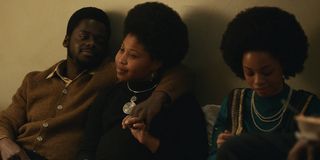Judas And The Black Messiah Writers Discuss Black People Not Being ‘Perceived As Human’

With powerful performances by LaKeith Stanfield and Daniel Kaluuya, Judas and the Black Messiah is a raw look at being Black in America. Not only is the story depicted in the film true, making it that much harder (and relevant) to watch, but it’s set in the 60s and history seems to keep repeating itself. The Lucas Brothers, writers of the film’s story, spoke out about African Americans not being perceived as human.
Judas and the Black Messiah follows William O’Neal (LaKeith Stanfield) as he becomes a double agent of sorts. Accepting a plea deal to stay out of prison, O’Neal joins the Chicago chapter of the Black Panther Party to help the police take down (and ultimately kill) Chairman Fred Hampton (Daniel Kaluuya). When I sat down with Keith and Kenny Lucas for an interview with CinemaBlend, the three of us discussed Hampton’s age and him not being seen as human by the people who killed him. Here’s what the Lucas Brothers said:
Kenny: You go back to Emmett Till. He's a baby and he was murdered by forces because they saw him not as a child, but they saw him as a monster. And I think that's the thing about white supremacy, historically, is that African Americans aren’t perceived as human. We're perceived as this other worldly thing that has to be neutralized or destroyed or controlled or contained. It's just very strange when you're like, look we're people.Keith: But at the end of the day, it's all projection, right? Like you have these forces who, they're the animal, the devil, the monster, and they project that onto the “other” – they project that onto us. And we see it in the film, that [J. Edgar] Hoover is the monster. History is going to remember Hoover as the monster, but he saw us as the monster and he had the power.
Fred Hampton was a 21-year-old college kid when he was assassinated. He wasn’t a criminal. He was a person who spoke out against police brutality and fought to keep his community safe from being senselessly murdered. He had a family. He was in love. But he was painted as a dangerous threat that needed to be neutralized, by his own government. As the Lucas Brothers shared:
Kenny: Once you categorize a group of people as the “other” they instantly lose their humanity, they're no longer kids. If they can't be kids who are growing, you know, there are no coming-of-age stories about young Black men. All the stories are of us as criminals or thugs or gangsters or whatever, and that’s just pure projection to justify the violence that they've committed against us.Keith: And that ethos is shared throughout the country. It always rears its ugly head. Like Tamir Rice. He's a boy, he's a baby, and he was murdered like he was… they were allowed to just walk in.Kenny: Or the stuff in Wisconsin with the guy who killed two people. Give him water, and he's a hero. And they're like, ‘Oh, he's just a boy.’ It's like, you don't get to be human when you're a Black guy or woman.
Judas and the Black Messiah humanizes Hampton by taking the time to strip him of the militant Black Panther caricature and depict him as a real, fully developed person. The Lucas brothers have a lot more stories to tell, and they’re just two of the many people working to change the overall perception of African Americans. Although this film hurt my soul and made me cry, I loved it and I’m so glad it’s been told in the way that it has. It gives hope to those of us who have to choose where we live and how we act based on how the people around us perceive the color of our skin.
You can see Judas and the Black Messiah in select theaters and streaming on HBO Max. Let me know in the comments the titles of other films that stirred an emotion deep in your soul like an emotional wrecking ball.
CINEMABLEND NEWSLETTER
Your Daily Blend of Entertainment News
Obsessed with Hamilton and most things Disney. Gets too attached to TV show characters. Loves a good thriller, but will only tolerate so much blood.

